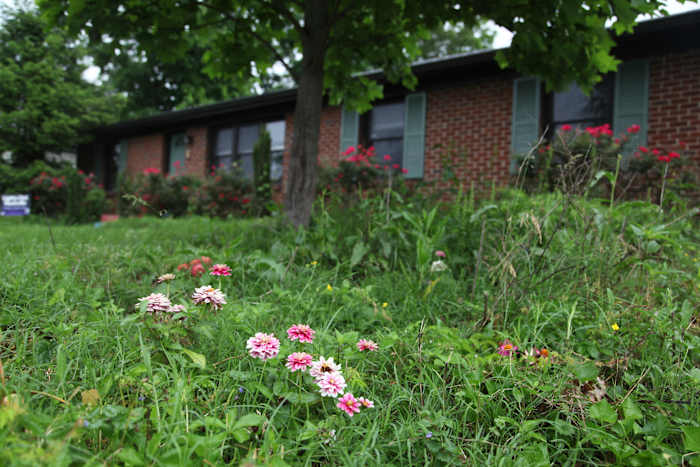NASHVILLE, Tenn. – No Mow May encourages homeowners to stash the lawn mower each spring and let flowers and grass grow for pollinators and water retention. And if your neighbor’s lawn already looks like a wildflower field most of the time, it could be more intentional than passersby might assume.
The movement has expanded to “Let It Bloom June” and the fall version: “Leave the leaves.” Conservation and horticulture groups say year-round low-mowing while selectively leaving native plants to grow can save huge amounts of drinking water and lead to lasting and impactful ecological changes.
When Amanda Beltramini Healan moved into her Nashville ranch house in 2016, the yard had been manicured for sale: a walnut tree, roses from a home improvement store and short grass. So she experimented, first with a 10-by-10-foot patch where she dug up the grass and sowed native seeds. Then she planted goldenrods in the culvert near the street, and let more of her yard grow tall without mowing.
Local authorities apparently didn’t appreciate her natural look: “I got a letter from the city saying that I had to mow it,” she said.
But then, a friend told her about No Mow Month signs, provided by the Cumberland River Compact, a local water conservation nonprofit. Soon she was signaling to the city that she’s no derelict, but a participant in an international movement.
These days, every month is No Mow May in parts of her property. While she keeps the growth shorter near the culvert and street, her backyard is filled with native grasses and plants up to her knees or waist. There’s a decomposing tree trunk where scores of skinks and bugs live, birds nest under her carport and she regularly finds fawns sleeping in the safety of the high grasses.
“I have a lot of insects and bugs and that’s protein, so the birds and the bird’s nests are everywhere. Cardinals and wrens and cowbirds and robins,” she said. “I wake up to them, especially during spring migration right now. It’s just a cacophony in the morning and in the evening, especially when the mulberries come in.”
The movement is popularized by groups such as Plantlife, a conservation organization based in England.
American lawns, based on English and French traditions, are increasingly seen as a wasteful monoculture that encourages an overuse of pesticides, fertilizer and water. Outdoor spraying and irrigation account for over 30% of a U.S. household’s total water consumption, and can be twice that in drier climates, according to the EPA.
Some criticize No Mow campaigns as a fad that could invite invasive plants to spread unchecked without helping pollinators much, if only done for a month.
A guide outlining No Mow pros, cons and limitations, written by consumer horticulture extension specialist Aaron Steil at Iowa State University, says reducing mowing to every two weeks and replacing turf with plants that pollinate all year long can offer more benefits without risking a citation or complaints.
The No Mow effort does encourage people to think more about biodiversity in their yards, and many local nature organizations advise provide guidance on picking noninvasive plants that fit each region’s climate and precipitation levels.
Reducing mowing encourages longer-rooted native grasses and flowers to grow, which breaks up compacted soil and improves drainage, “meaning that when it rains, more water is going to be captured and stored in lawns versus being generated as a runoff and entering into our stormwater system,” said Jason Sprouls, urban waters program manager for the Cumberland River Compact.
Beltramini Healan isn’t just letting just anything grow — she learned which plants are invasive, non-native or not beneficial to the ecosystem and carefully prunes and weeds so the keepers have room to thrive.
Nashville homeowner Brandon Griffith said he was just tired of mowing when he decided years ago wait and see what comes up. Then he consciously added flowering plants to attract bees and bugs. Now he sees so many insects and pollinators all over his garden that the neighbors’ kids come over to look for butterflies.
It’s about giving them the time “to come out of their larva or their egg stage and be able to grow,” said Griffith. He said he’s never heard a complaint — in fact, some of his neighbors also stopped mowing for a month each spring. His four-year-old son catches lizards, digs for worms and hunts for bugs in the yard.
“I just enjoy coming out and walking around,” said Griffith. “And looking at it, it’s kind of peaceful. It’s kinda relaxing.”
__
This story has been updated to correct the spelling of Amanda Beltramini Healan’s name and to correct that Aaron Steil works at Iowa State University, not the University of Iowa.
Copyright 2025 The Associated Press. All rights reserved. This material may not be published, broadcast, rewritten or redistributed without permission.


